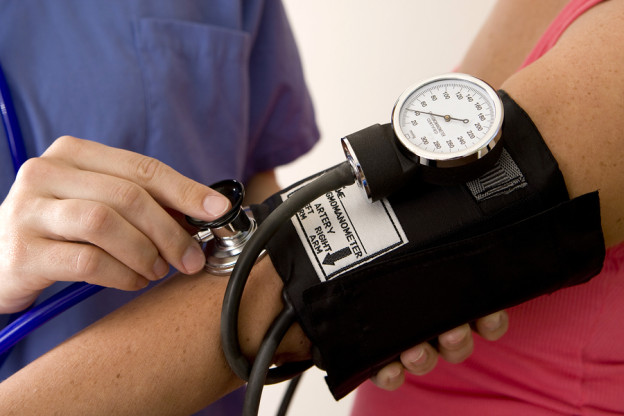By David Blyweiss, M.D., Advanced Natural Wellness
December 7, 2015
- Blood pressure meds do more harm than good
- What beta blockers and diuretics do to your heart health
- My #1 secret for lowering blood pressure
A couple months ago a new report came out showing prescription drug trends in the U.S. The fact that well over half the population takes prescription meds was disturbing, but not surprising. However, something else was.
I fully expected that the class of drugs used most often by patients would be statins.
Well, I was wrong. Even though statin use more than doubled in a 12 year period, they turned out to be the second most-used class of drugs. The top spot was taken by blood pressure meds.
I won’t say I was blown away by this. Still, I was a little taken aback by the idea that so many people – maybe even you or some of your family members – are still taking drugs to control their blood pressure when it’s so easily manageable without them.
This is a big problem. That’s because these meds can quickly do more harm to your heart health than good.
MD Exposes the Hidden Danger to Your Eyes

When your eyesight starts to fail, it's a real problem. Suddenly you can't go to the grocery store... you can't get to the doctor if you have an emergency... you can't meet your friends for dinner…
Your "regular" doctor doesn't have time to keep up with the latest research. And the same goes for eye doctors. They go to school to learn how to fit you for glasses and contacts, but have no way of preventing the damage and loss of eyesight that threatens your freedom and independence.
Let me show you something that explains a LOT about how your eyes work.
In my FREE Special Report, I'll show you a HUGE, untapped resource for your eyes that safely and naturally restores clear, effortless eyesight.
Click here to get started...
For example, certain types of beta blockers like atenolol and metroprolol can worsen glycemic control, lower HDL and increase triglycerides. All of these events actually increase your risk of heart disease.
At the same time, they can make you feel weak, fatigued, dizzy and short of breath. The thing is, these are all symptoms of heart failure. But how do you know if it’s the medication…or time to call 911?
And what about diuretics?
This class of drugs reduces blood pressure by increasing the volume of water flushed out of your body. But they don’t just flush out water.
They also flush out magnesium and potassium, and that’s not good. A loss of magnesium and potassium will directly weaken your heart. Diuretics also have a bad effect on your cholesterol and triglyceride profiles.
Either one of these drugs can send you walking down the path to full-blown heart disease…and taking even more heart-draining prescription drugs before you know it.
On the other hand, there’s a natural and inexpensive way to can gain control of your blood pressure. No side effects included. And it can start working in as little as three hours.
Are You Suffering From...
- Love handles and a pot belly
- Romance that isn't what it used to
- Forgetfulness and inattention
- Low (or no) strength and endurance
- A sex drive that's shifted into neutral...or worse
If so...you may have Mature Male Burnout. Click here to discover more about this unique condition and what you can do about it.
All you have to do is boost your nitric oxide levels.
Nitric oxide, or NO, helps relax and expand blood vessels. This allows blood to surge through them exactly the way it should – without having to force its way through the blood vessels.
Now, you can increase NO levels by eating leafy greens like arugula, spinach and kale. These foods contain nitrates, which are converted to NO in your body.
But to get the kind of sustained boost in NO levels that will actually make a difference in your blood pressure, you need something more powerful.
Thankfully, there’s an easy and potent solution…
Just 250 ml of beetroot juice each day can lower your blood pressure by about 8/4 mmHg (8 points on the top number, 4 points on the bottom number). It also reduces arterial stiffness and thickening of the arteries.
If you still need a little help, try adding more garlic to your diet. The effects of this “stinky rose” are similar to those of the beta blocker atenolol, without the side effects. Garlic can also reduce plaque in your arteries and improve circulation.
Just two cloves a day will do the job. (Or if you want to keep your breath sweet smelling, try a supplement of 600 mg. aged garlic extract each day.)
There’s also a little trick to counter the effects of too much salt. Just add 4,700 mg of potassium and 400 to 800 mg of magnesium in your regular diet. Not only will these minerals improve your blood pressure, they’ll also cut your chances of coronary artery disease and stroke.
And by the way, I’d be remiss if I failed to remind you that a healthy, Mediterranean style diet and plenty of physical activity are critically important to a healthy blood flow and strong heart.
Sources:
Webb AJ, et al. Acute blood pressure lowering, vasoprotective, and antiplatelet properties of dietary nitrate via bioconversion to nitrite.Hypertension. 2008 Mar;51(3):784-90.
Kapil V, et al. Dietary nitrate provides sustained blood pressure lowering in hypertensive patients: a randomized, phase 2, double-blind, placebo-controlled study. Hypertension. 2015 Feb;65(2):320-7.
Ashraf R, et al. Effects of Allium sativum (Garlic) on systolic and diastolic blood pressure in patients with essential hypertension. Pak J Pharm Sci. 2013 Sep;26(5):859-63.
Houston MC. The importance of potassium in managing hypertension.Current Hypertension Report. 2011 Aug;13(4):309-17.
L Kass, et al. Effect of magnesium supplementation on blood pressure: a meta-analysis. Eur J Clin Nutr. 2012 Apr;66(4):411-8.







